| This article's lead section may be too short to adequately summarize the key points. Please consider expanding the lead to provide an accessible overview of all important aspects of the article. (March 2024) |
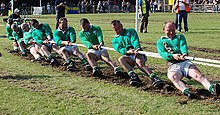 Ireland 600 kg team in the European Championships 2009 Ireland 600 kg team in the European Championships 2009 | |
| Highest governing body | Tug of War International Federation |
|---|---|
| Nicknames | TOW |
| First played | Ancient |
| Characteristics | |
| Contact | Non-contact |
| Team members | Eight (or more) |
| Mixed-sex | mix 4+4 and separate |
| Type | Team sport, outdoor/indoor |
| Equipment | Rope and boots |
| Presence | |
| Olympic | Part of the Summer Olympic programme from 1900 to 1920 |
| World Games | 1981–present |
| Tugging rituals and games ល្បែងទាញព្រ័ត្រ (Khmer) Punnuk (Filipino) 줄다리기 (Korean) Kéo Co (Vietnamese) | |
|---|---|
| UNESCO Intangible Cultural Heritage | |
| Country | Cambodia, Philippines, South Korea, Vietnam |
| Reference | 01080 |
| Region | Asia and the Pacific |
| Inscription history | |
| Inscription | 2015 (10th session) |
| List | Representative |
Tug of war (also known as tug o' war, tug war, rope war, rope pulling, or tugging war) is a sport that pits two teams against each other in a test of strength: teams pull on opposite ends of a rope, with the goal being to bring the rope a certain distance in one direction against the force of the opposing team's pull.
Terminology
The Oxford English Dictionary says that the phrase tug of war originally meant "the decisive contest; the real struggle or tussle; a severe contest for supremacy". Only in the 19th century was it used as a term for an athletic contest between two teams who haul at the opposite ends of a rope. Prior to that, French and English was the commonly used name for the game in the English-speaking world.
Origin

The origins of tug of war are uncertain, but this sport was practised in Cambodia, ancient Egypt, Greece, India, and China. According to a Tang dynasty book, The Notes of Feng, tug of war, under the name 'hook pulling' (牽鉤), was used by the military commander of the State of Chu during the Spring and Autumn period (8th to 5th centuries BC) to train warriors. During the Tang dynasty, Emperor Xuanzong of Tang promoted large-scale tug of war games, using ropes of up to 167 metres (548 ft) with shorter ropes attached, and more than 500 people on each end of the rope. Each side also had its own team of drummers to encourage the participants.
In ancient Greece, the sport was called helkystinda (Greek: ἑλκυστίνδα), ephelkystinda (ἐφελκυστίνδα) and dielkystinda (διελκυστίνδα), which derives from dielkō (διέλκω), meaning amongst others 'I pull through', all deriving from the verb helkō (ἕλκω), 'I draw, I pull'. Helkystinda and ephelkystinda seem to have been ordinary versions of tug of war, while dielkystinda had no rope, according to Julius Pollux. It is possible that the teams held hands when pulling, which would have increased difficulty, since handgrips are more difficult to sustain than a grip of a rope. Tug of war games in ancient Greece were among the most popular games used for strength and would help build strength needed for battle in full armor.

Archeological evidence shows that tug of war was also popular in India in the 12th century:
There is no specific time and place in history to define the origin of the game of Tug of War. The contest of pulling on the rope originates from ancient ceremonies and rituals. Evidence is found in countries like Egypt, India, Myanmar, New Guinea... The origin of the game in India has strong archaeological roots going back at least to the 12th century AD in the area what is today the State of Orissa on the east coast. The famous Sun Temple of Konark has a stone relief on the west wing of the structure clearly showing the game of Tug of War in progress.
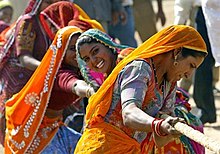
Tug of war stories about heroic champions from Scandinavia and Germany circulate Western Europe where Viking warriors pull on animal skins over open pits of fire in tests of strength and endurance, in preparation for battle and plunder.
During the 16th and 17th centuries, tug of war was popularised during tournaments in French châteaux gardens and later in Great Britain.
In the 19th century, tug of war began a new tradition among seafaring men who were required to tug on lines to adjust sails while ships were under way and even in battle.
The Mohave people occasionally used tug-of-war matches as means of settling disputes.
As a sport
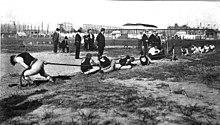
There are tug of war clubs in many countries, and both men and women participate.
The sport was part of the Olympic Games from 1900 until 1920, but has not been included since. The sport is part of the World Games. The Tug of War International Federation (TWIF), organises World Championships for nation teams biannually, for both indoor and outdoor contests, and a similar competition for club teams.
In England the sport was formally governed by the AAA until 1984, but is now catered for by the Tug of War Association (formed in 1958), and the Tug of War Federation of Great Britain (formed in 1984). In Scotland, the Scottish Tug of War Association was formed in 1980. The sport also features in Highland Games.
Between 1976 and 1988 Tug of War was a regular event during the television series Battle of the Network Stars. Teams of celebrities representing each major network competed in different sporting events culminating into the final event, the Tug of War. Lou Ferrigno's epic tug of war performance in May 1979 is considered the greatest feat in 'Battle' history.
National organizations
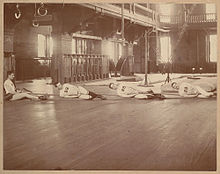
The sport is played almost in every country in the world. However, some countries have set up a national body to govern the sport. Most of these national bodies are associated with the international governing body: TWIF, The Tug of War International Federation. As of 2008 there are 53 countries associated with TWIF, among which are Scotland, Ireland, England, India, Switzerland, Belgium, Italy, South Africa and the United States.

Regional variations
Burma (Myanmar)
In Myanmar (Burma), the tug of war, called lun hswe (လွန်ဆွဲ; pronounced [lʊ̀ɰ̃ sʰwɛ́]) has both cultural and historical origins. It features as an important ritual in phongyibyan, the ceremonial cremation of high-ranking Buddhist monks, whereby the funerary pyres are tugged between opposite sides. The tug of war is also used as a traditional rainmaking custom, called mo khaw (မိုးခေါ်; pronounced [mó kʰɔ̀]), to encourage rain. The tradition originated during the reign of King Shinmahti in the Bagan Era. The Rakhine people also hold tug of war ceremonies called yatha hswe pwe (ရထားဆွဲပွဲ) during the Burmese month of Tabodwe.
Indonesia
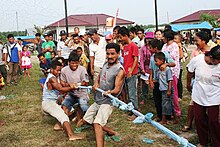
In Indonesia, Tarik Tambang is a popular sport held in many events, such as the Indonesian Independence Day celebration, school events, and scout events. The rope used is called dadung, made from fibers of lar between two jousters. Two cinder blocks are placed a distance apart and the two jousters stand upon the blocks with a rope stretched between them. The objective for each jouster is to either a) cause their opponent to fall off their block, or b) to take their opponent's end of the rope from them.
Japan

In Japan, the tug of war (綱引き, tsunahiki) is a staple of school sports festivals. The tug of war is also a traditional way to pray for a plentiful harvest throughout Japan and is a popular ritual around the country. The Kariwano Tug of war in Daisen, Akita, is said to be more than 500 years old, and is also a national folklore cultural asset. The Underwater Tug of War Festival in Mihama, Fukui, is 380 years old, and takes place every January. The Sendai Great Tug of War in Satsumasendai, Kagoshima is known as Kenka-zuna or 'brawl tug'. Around 3,000 men pull a huge rope which is 365 metres (1,198 ft) long. The event is said to have been started by feudal warlord Yoshihiro Shimadzu, with the aim of boosting the morale of his soldiers before the decisive Battle of Sekigahara in 1600. Nanba Hachiman Jinja's tug of war, which started in the Edo period, is Osaka's folklore cultural asset. The Naha Tug-of-war in Okinawa is also famous.
Korea
Main article: JuldarigiJuldarigi (Korean: 줄다리기, also chuldarigi) is a traditional Korean sport similar to tug of war. It has a ritual and divinatory significance for many agricultural communities in the country and is performed at festivals and community gatherings. The sport uses two huge rice-straw ropes, connected by a central peg, which is pulled by teams representing the East and West sides of the village (the competition is often rigged in favor of the Western team). A number of religious and traditional rituals are performed before and after the actual competition.
New Zealand
A variant, originally brought to New Zealand by Boston whalers in the 1790s, is played with five-person teams lying down on cleated boards. The sport is played at two clubs in Te Awamutu and Hastings, supported by the New Zealand Tug of War Association. A four-person variant is played at the National Rover Scout Moot.
Peru
The Peruvian children's series Nubeluz featured its own version of tug of war (called La Fuerza Glufica), where each team battled 3-on-3 on platforms suspended over a pool of water. The object was simply to pull the other team into the pool.
Poland
In Poland, a version of tug of war is sometimes played using a dragon boat, where teams of six or eight attempt to row towards each other.
Basque Country
In the Basque Country, this sport is considered a popular rural sport, with many associations and clubs. In Basque, it is called Sokatira.
United States
In the United States, a form of tug of war using eight handles is used in competition at camps, schools, churches, and other events. The rope is called an "Oct-O Pull" and provides two-way, four-way and eight-way competition for 8 to 16 participants at one time.
- Each Fourth of July, two California towns separated by an ocean channel Stinson Beach, California and Bolinas, California gather to compete in an annual tug of war.
- The towns of Leclaire, Iowa, and Port Byron, Illinois, compete in a tug of war across the Mississippi River every year in August since 1987 during Tug Fest.
- A special edition of the Superstars television series, called "The Superteams", features a tug of war, usually as the final event.
- The Battle of the Network Stars featured a tug of war as one of its many events.
- A game of tug of war, on tilted platforms, was used on the US, UK and Australian versions of the Gladiators television series, although the game was played with two sole opposing participants.
- The last known "cleated" tug of war, takes place in Tuolumne CA at the annual Tuolumne Lumber Jubilee. It takes place the weekend after Fathers Day.
Miami University

Puddle Pull is a biannual tug of war contest held at Miami University. The event is a timed, seated variation of tug of war in which fraternities and sororities compete. In addition to the seated participants, each team has a caller who coordinates the movements of the team.
Although the university hosted an unrelated freshman vs. sophomores tug of war event in the 1910s and 1920s, the first record of modern Puddle Pull is its appearance as a tug of war event in the school's newspaper, The Miami Student, in May 1949. This fraternity event was created by Frank Dodd of the Miami chapter of Delta Upsilon. Originally, the event was held as a standing tug of war over the Tallawanda stream near the Oxford waterworks bridge in which the losers were pulled into the water. This first event was later seen as a driving force for creating interfraternity competitive activities (Greek Week) at Miami University. As a part of moving to a seated event, a new rule was created in 1966 to prohibit locks and created the event that is seen today with the exception of a large pit that was still being dug in between the two teams. The event is held in a level grass field and uses a 3.8 cm (1.5 in) diameter rope that is at least 15.2 m (50 ft) long is used for the event. Footholes or "pits" are dug for each participant at 50 cm (20 in) intervals. The pits are dug with a flat front and an angled back. Women began to compete sporadically starting in the 1960s and became regular participants as sorority teams in the mid-1980s.
Hope College
The Hope College Pull is an annual tug-of-war contest held across the Black River in Holland, Michigan on the fourth Saturday after Labor Day. Competitors are 40 members of the freshman and sophomore classes.
Formal rules
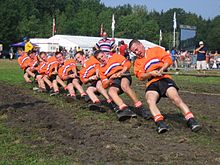
Two teams of eight, whose total mass must not exceed a maximum weight as determined for the class, align themselves at the end of a rope approximately 11 centimetres (4.3 in) in circumference. The rope must be free from knots and other "holdings for the hands". The rope is marked with a "centre line" and two markings 4 metres (13 ft) to either side of the centre line. The teams start with the rope's centre line directly above a line marked on the ground, and once the contest (the "pull") has commenced, attempt to pull the other team such that the marking on the rope closest to their opponent crosses the centre line, or the opponents commit a foul.
Lowering one's elbow below the knee during a pull, known as "locking", is a foul, as is touching the ground for extended periods of time. The rope must go under the arms; actions such as pulling the rope over the shoulders may be considered a foul. These rules apply in highly organized competitions such as the World Championships. However, in small or informal entertainment competitions, the rules are often arbitrarily interpreted and followed.
A contest may feature a moat in a neutral zone, usually of mud or softened ground, which eliminates players who cross the zone or fall into it.
Tactics
| This section does not cite any sources. Please help improve this section by adding citations to reliable sources. Unsourced material may be challenged and removed. (September 2014) (Learn how and when to remove this message) |


Aside from the raw muscle power needed for tug of war, it is also a technical sport. The cooperation or "rhythm" of team members is just as important as physical strength. To achieve this, a person called a "driver" is used to harmonize the team's joint traction power. The driver moves up and down next to their team pulling on the rope, giving orders to them when to pull and when to rest (called "hanging"). If the driver spots the opposing team trying to pull the driver's team away, the driver gives a "hang" command, each member will dig into the grass with their boots and movement of the rope is limited. When the opponents are played out, the driver shouts "pull" and rhythmically waves their hat or handkerchief for their team to pull together. Slowly but surely, the other team is forced into surrender by a runaway pull. Another factor that affects the game is the players' weights. The heavier someone is, the more static friction their feet have to the ground, but if there is not enough friction and they weigh too little, even if they are pulling extremely hard, the force will not be transmitted to the rope. Their feet will simply slide along the ground if their opponent(s) have better static friction with the ground. In general, as long as one team has enough static friction and can pull hard enough to overcome the static friction of their opponent(s), that team can easily win the match.
Injury risks
In addition to injuries from falling and from back strains (some of which may be serious), catastrophic injuries may occur as a result of looping or wrapping the rope around a hand or wrist, or impact from snapback if the rope should break. This may cause permanent damage to the body, requiring finger, hand, or even arm amputations.
Amateur organizers of tugs of war may underestimate the forces generated and thus, may be unaware of the possible consequences if a rope snaps under extreme tension. Injury is primarily due to the large amount of potential energy stored in the rope during the competition. As both sides pull, tension is placed on the rope causing it to stretch as described by Hooke's law. If a rope exceeds its breaking point the potential energy is suddenly converted to kinetic energy and the broken ends of the rope will snapback at great speed, which can cause serious injuries. This phenomenon has been studied in ship operations as mooring ropes pose the same risk should they snap. For this reason, specially engineered tug of war ropes exist that can safely withstand the forces generated.
Notable incidents
| Date | Location | Rope snapped | Deaths | Severely Injured | Overall injured | Total participants | Death cause / injury details | Rope details | Other information |
|---|---|---|---|---|---|---|---|---|---|
| 13 June 1978 | Harrisburg, Pennsylvania, USA | 0 | 6 | 200 | ~2,300 | 6 fingers and thumbs amputated | 2000 foot (600 m) rope rated for 13,000 lbf (58 kN) | Middle school Guinness Book of Records attempt | |
| 4 June 1995 | Westernohe, Germany | 2 | 5 | 29 | 650 | Crushed and hit ground hard | "Thumb-thick" nylon | Scouts attempt Guinness Book of Records entry | |
| 25 October 1997 | Taipei, Taiwan | 0 | 2 | 42 | 1500 | Arms severed below shoulder | 5 cm (2 in) nylon, max. strength 26,000 kilograms (57,000 lb) | Official event, with foreign dignitaries | |
| 4 February 2013 | El Monte, California, USA | 0 | 2 | 2 | ~40 | 9 fingers amputated | Unknown | Lunchtime high school activity | |
| 14 December 2018 | Somaiya Vidyavihar University, Mumbai, India | 1 | 0 | 0 | Unknown | Cardiac arrest, unknown cause | Unknown | Sports day at Somaiya College of Nursing | |
| 18 December 2022 | Makassar, Indonesia | 1 | 3 | 13 | 5,294 | Head pulled into concrete barrier by rope | Unknown | World Record Attempt |
In popular culture
- The American game show Tug of Words uses a virtual tug of war as its central scoring mechanism.
- Tug of war is featured as a game in the South Korean Netflix TV show Squid Game.
Notes
- Oxford English Dictionary
- Samuel Williams: The Boy's Treasury of Sports, Pastimes, and Recreations. Clark, Austin and Co., New York 1847, p. 58.
- Edmund Routledge, ed.: Every Boy's Book: A Complete Encyclopaedia of Sports and Amusements. George Routledge and sons, 1869, p. 3.
- The bas-relief of the Churning of the Sea of Milk shows Vishnu in the centre, his turtle avatar Kurma below, asuras and devas to left and right, and apsaras and Indra above.
- Tang dynasty Feng Yan: Notes of Feng, volume 6
- διελκυστίνδα Archived 2021-09-06 at the Wayback Machine, Henry George Liddell, Robert Scott, A Greek-English Lexicon, on Perseus
- διέλκω Archived 2019-12-29 at the Wayback Machine, Henry George Liddell, Robert Scott, A Greek-English Lexicon, on Perseus
- ἕλκω Archived 2021-09-06 at the Wayback Machine, Henry George Liddell, Robert Scott, A Greek-English Lexicon, on Perseus
- Pollux, 9.112
- Jaime Marie Layne, The Enculturative Function of Toys and Games in Ancient Greece and Rome, ProQuest, UMI Dissertation Publishing, 2011
- "Tug of War Federation of India: History".
- "Equity Gaming: History of Tug of War". Archived from the original on 2008-10-15. Retrieved 2008-06-01.
- , Page 133.
- "Tug of war – Traditional Games Federation of India". Retrieved 2024-06-27.
- "Figest.it". Archived from the original on 2015-06-25. Retrieved 2015-06-28.
- "Tug of War for Rain". The Myanmar Times. 2019-05-17. Archived from the original on 2019-05-31. Retrieved 2019-05-31.
- ကံထွန်း (2017-08-02). "ရခိုင်ရိုးရာ ရထားဆွဲပွဲ ပျော်ပျော်ရွှင်ရွှင်တူဆင်နွှဲ". Myanmar Ministry of Information. Archived from the original on 2020-07-28. Retrieved 2021-12-22.
- Mary Hirt, Irene Ramos (2008), "Rope Jousting", Maximum Middle School Physical Education, Human Kinetics, p. 144, ISBN 978-0-7360-5779-0
- Kariwano Ootsunahiki Archived 2015-05-26 at the Wayback Machine NHK
- Underwater Tug-of-War Festival in Mihama Archived 2018-09-16 at the Wayback Machine Fukui Shimbun, 2013/01/20
- SENDAI GREAT TUG-of WAR (Sendai Otsunahiki / 川内大綱引き) Kagoshima Internationalization Council.
- Tsunahiki Shinji(Shinto ritual) Archived 2015-09-04 at the Wayback Machine Nanba Hachiman Jinja, 2015/01/18
- Stiles, Carol (27 June 2020). "Tug-of-war fan desperate to keep sport alive – 'It's weightlifting lying down'". RNZ. Archived from the original on 26 June 2020. Retrieved 27 June 2020.
- Lynch, Molly (26 March 2015). "Dragon boat tug of war is Poland's newest sports craze". Mashable. Archived from the original on 2018-11-16. Retrieved 2017-08-15.
- "Recreation Specialists". Archived from the original on 2008-12-05. Retrieved 2021-09-09.
{{cite web}}: CS1 maint: unfit URL (link) - "Uniquely West Marin: Fourth of July Tug of War | Point Reyes Weekend". Archived from the original on 2013-07-18. Retrieved 2013-01-03.
- "Holiday hoopla, happenings around Marin". Archived from the original on 2009-07-06.
- "Home". Tugfest. Archived from the original on 2018-08-31. Retrieved 2018-08-30.
- "Delta Chis Win Tug-O-War As Large Crowd Watches". The Miami Student. Vol. 074, no. 55. May 24, 1949. Archived from the original on August 1, 2018. Retrieved March 20, 2018.
- "Fraternity Tug-O-War Teams Begin Practice For Struggle". The Miami Student. Vol. 074, no. 56. May 20, 1949. Archived from the original on August 1, 2018. Retrieved March 20, 2018.
- "Greek Week Has Brief, Busy Past". The Miami Student. Vol. 088, no. 44. April 20, 1965. Archived from the original on August 1, 2018. Retrieved March 20, 2018.
- "Greeks Set Theme Of 'Athenian Antics'". The Miami Student. Vol. 088, no. 42. April 13, 1965. Archived from the original on August 1, 2018. Retrieved March 20, 2018.
- "Greek Week Scheduled". The Journal News. April 29, 1971. p. 62. Archived from the original on August 1, 2018. Retrieved March 20, 2018.
- Farrand, Allison (October 4, 2016). "Victory in Hope College annual 'Pull' goes to sophomore class". MLive Media Group. Archived from the original on August 2, 2018. Retrieved August 1, 2018.
- "Twif Mission Statement" (PDF).
- ^ "TWIF Rules". 2017 TWIF Rules Manual. Tug of War International Federation. 2017. Archived from the original on 2018-04-09. Retrieved 2018-04-08.
- Crockett, Zachary (8 March 2017). "A History of Tug-of-War Fatalities". Priceonomics. Archived from the original on 24 December 2020. Retrieved 21 February 2021.
- Paul, Walter (August 1970). "Review of Synthetic Fiber Ropes" (Report No. AD-A0-84-62-2). US Coast Guard Academy. pp. 41–46. Archived (PDF) from the original on 12 October 2021. Retrieved 21 February 2021.
- "2015". Archived from the original on 2018-09-16. Retrieved 2019-08-28.
- "Tug-of-War Ends in Multiple Injuries". Gadsden Times. 14 June 1978. Archived from the original on 12 September 2021. Retrieved 15 March 2017.
- "2 Boy Scouts Die When Tug-Of-War Rope Snaps". Archived from the original on 2015-06-26. Retrieved 2015-06-25.
- Two Men Lose Arms in tug-of-war Archived 2020-07-28 at the Wayback Machine, The Nation, October 27, 1997 (available at Google.news).
- Tug-of-war: accident leaves arms hanging and mayor apologetic Archived 2013-05-28 at the Wayback Machine (China Times Tue, Oct 28, 1997 edition (available at Chinainformed.com).
- Taiwanese doctors reattach arms ripped off in tug-of-war Archived 2014-08-20 at the Wayback Machine, Boca Raton News, October 27, 1997, Page 7A, (available as new
- Disarmed – Disarmanent at Snopes.com.
- "Teens recovering after losing fingers during tug-of-war match". Associated Press. February 5, 2013. Archived from the original on February 7, 2013.
- ^ "The finger-severing tug-of-war incident". Archived from the original on 2019-09-30. Retrieved 2018-05-03.
- "Mumbai: Teen student dies playing tug of war on campus". The Times of India. December 15, 2018. Archived from the original on December 16, 2018.
- "Woman killed in tug-of-war game after rope pings back and drags her into concrete block". Mirror. December 21, 2022.
Bibliography
- Henning Eichberg, "Pull and tug: Towards a philosophy of the playing 'You'", in: Bodily Democracy: Towards a Philosophy of Sport for All, London: Routledge 2010, pp. 180–199.
External links
- Tug of War International Federation
- The Tug of War Association (England)
- Tug of War (Sports123.com, via Wayback Machine, Internet Archive): list of winners in the main championships
| Sports of the World Games program | |
|---|---|
| Artistic and dance sports | |
| Ball sports | |
| Martial arts | |
| Precision sports | |
| Strength sports | |
| Trend sports | |
| Past official sports | |
| Invitational sports | |
| Team sports | |||||||||||||||||||||||||||||||||||||||||||
|---|---|---|---|---|---|---|---|---|---|---|---|---|---|---|---|---|---|---|---|---|---|---|---|---|---|---|---|---|---|---|---|---|---|---|---|---|---|---|---|---|---|---|---|
| Ball sports |
| ||||||||||||||||||||||||||||||||||||||||||
| Tag sports | |||||||||||||||||||||||||||||||||||||||||||
| Water sports | |||||||||||||||||||||||||||||||||||||||||||
| Other non-ball sports | |||||||||||||||||||||||||||||||||||||||||||